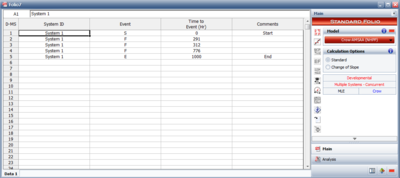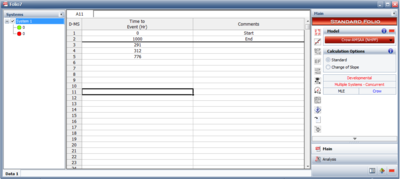Template:Multiple systems (concurrent operating times): Difference between revisions
(Created page with '====Multiple Systems (Concurrent Operating Times)==== This data type is used for tests where a number of systems are tested and the start, end of failure times are recorded. This…') |
|||
| Line 1: | Line 1: | ||
====Multiple Systems (Concurrent Operating Times)==== | ====Multiple Systems (Concurrent Operating Times)==== | ||
This data type is used for tests where a number of systems are tested and the start, end of failure times are recorded. This data type assumes uniform time accumulation and that the systems are tested simultaneously. As an example, consider the data of two systems shown in | This data type is used for tests where a number of systems are tested and the start, end of failure times are recorded. This data type assumes uniform time accumulation and that the systems are tested simultaneously. As an example, consider the data of two systems shown in the next figure. System 1 begins testing at time equals 0 (with a start event, S) and failures are encountered and corrected at 281, 312 and 776 (with failure events, F). Testing stops at 1000 hours (with an end event, E). System 2 begins testing at time equals 0 and failures are encountered and corrected at 40, 222 and 436. Testing stops at 500 hours. RGA has two options to view this type of data. Figure fignormview shows the normal view, while Figure figadvview shows the advanced view. Both figures represent the same data. | ||
<br> | <br> | ||
<br> | <br> | ||
Revision as of 19:58, 6 June 2012
Multiple Systems (Concurrent Operating Times)
This data type is used for tests where a number of systems are tested and the start, end of failure times are recorded. This data type assumes uniform time accumulation and that the systems are tested simultaneously. As an example, consider the data of two systems shown in the next figure. System 1 begins testing at time equals 0 (with a start event, S) and failures are encountered and corrected at 281, 312 and 776 (with failure events, F). Testing stops at 1000 hours (with an end event, E). System 2 begins testing at time equals 0 and failures are encountered and corrected at 40, 222 and 436. Testing stops at 500 hours. RGA has two options to view this type of data. Figure fignormview shows the normal view, while Figure figadvview shows the advanced view. Both figures represent the same data.
[math]\displaystyle{ }[/math]
[math]\displaystyle{ }[/math]
When entering data within the normal view, each system must be initiated with a start event. Figure fignormview shows an example of that format.

